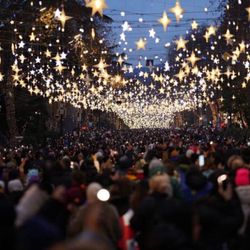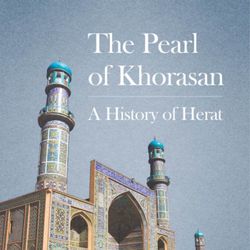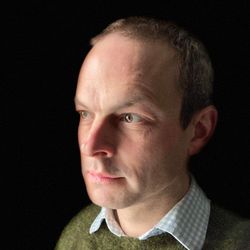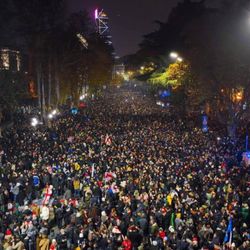Share

Behind The Lines with Arthur Snell
The tragedy of Haiti and what we can learn from it
Season 2, Ep. 10
•
Professor Amalendu Misra of the University of Lancaster is an expert in Latin America and the Caribbean, notably Haiti. I spoke to him about the current crisis there and what it tells us about the wider region.
More episodes
View all episodes

BONUS EPISODE - CRISIS IN GEORGIA
01:10:41|Marika Mariashvili returns for a special bonus episode as Georgia faces a constitutional crisis - the existing president refusing to cede power after a stolen election, and a new puppet in place taking his order from Moscow.
19. Charles Gammell on Iran post-Assad
49:47||Season 3, Ep. 19What does the fall of Assad mean for the mad Mullahs running Iran? I spoke to Charles Gammell.
18. Christmassy Episode: Miguel Delaney on the geopolitics of football
54:35||Season 3, Ep. 18Miguel Delaney, Chief Football Writer at the Independent is the author of states of play, a book about the geopolitics of football. You can find him on Bluesky and Twitter.migueldelaney
17. Inside HTS: what does Al-Jolani want and how will they rule?
01:07:23||Season 3, Ep. 17There are literally a tiny number of people in this world who can speak with authority and insight on Hay'at Tahrir Al-Sham - or HTS - the militant group that swept into Damascus a week ago. One of those people is Orwa Ajjoub, a Sweden-based academic of Syrian origin who has been studying this group for several years and who has direct contacts inside the group.I feel incredibly privileged to have had an extensive conversation with Orwa about HTS's origins, their evolving relationship with jihadism, their intentions and ambitions now in power and whether Al-Jolani is genuinely no longer part of a terrorist network. I found the whole discussion absolutely fascinating and I hope that you do too.You can follow Orwa's work here: https://x.com/OAjjoub and here https://www.mei.edu/profile/orwa-ajjoub and here https://bsky.app/profile/orwaajjoub.bsky.social If you feel able, please support the work of this podcast by becoming a paid subscriber of my substack arthursnell.substack.com
16. The history of Syria, from the Pharaohs to the Pharaonic
53:01||Season 3, Ep. 16I spoke to the brilliant historian James Barr about the history of Syria from the Pharaohs to the present day. You can find James on Bluesky https://bsky.app/profile/jamesbarr.bsky.social and his books in all the good book places.Please check out my susbtack and - if you feel like supporting this podcast and are able to - take out a paid subscription which is enormously appreciated. https://arthursnell.substack.com
15. Georgia: fighting to be European
55:27||Season 3, Ep. 15With bewildering events unfolding all over the place, I wanted to give some coverage to the Republic of Georgia, where the pro-Western political movement is responding to a rigged election and the decision of the illegitimate Moscow-aligned 'Georgian Dream' to block negotiations to join the EU, in spite of the fervent wish of most Georgians to join the bloc. Huge demonstrations have broken out all over the country, in spite of intimidation and violence from police and security forces, some of whom may be Russian imports.I was privileged to be able to speak to Marika Mariashvili, a politician and academic who has been active at the heart of the democracy movement in the country. You can (and should!) follow Marika on BlueSky https://bsky.app/profile/marikamikiashvili.bsky.social or Twitter https://x.com/Mikiashvili_M. This is genuinely a transitional moment in this country's story.
EMERGENCY EPISODE: The Fall of Aleppo
35:35|The extraordinary turn of events in Syria in recent days saw the city of Aleppo, once Syria's largest and a key part of the earlier story of Syria's revolution, fall to Syria's rebels, with the soldiers of the Assad regime in chaotic retreat. I spoke to Thomas van Linge, one of the few journalist who has been covering the story, about what has happened and the reasons why.You can support Thomas's work here https://ko-fi.com/thomasvlinge and he is active on Twitter and Bluesky.If you'd like to support this podcast the easiest way to do that is becoming a paid subscriber of my Substack: arthursnell.substack.com
14. Out of the shadows: MI6 Russia expert Christopher Steele on Trump and the new world order
46:24||Season 3, Ep. 14Christopher Steele needs almost no introduction. But if you are interested in learning more about him you can buy his new book, Unredacted, here https://www.amazon.com/Unredacted-Russia-Trump-Fight-Democracy/dp/0063373432/ref=sr_1_1?crid=VZCQ114PBRZX&dib=eyJ2IjoiMSJ9.qv6Zf5VhmrCD7zu54PyFEawg2dYzrTOT0sYgpY4o3jI.poSf3-HXXCfxlQwgK_vy6Xubh-BXVRLmOA0iPDWXVhc&dib_tag=se&keywords=unredacted+christopher+steele&qid=1732891790&sprefix=unredac%2Caps%2C201&sr=8-1
13. What's going on in Iran
01:01:04||Season 3, Ep. 13Charlie Gammell is a historian and Iran expert. His latest article on Iran can be found here: https://www.spectator.co.uk/article/the-winds-of-change-are-blowing-in-iran/